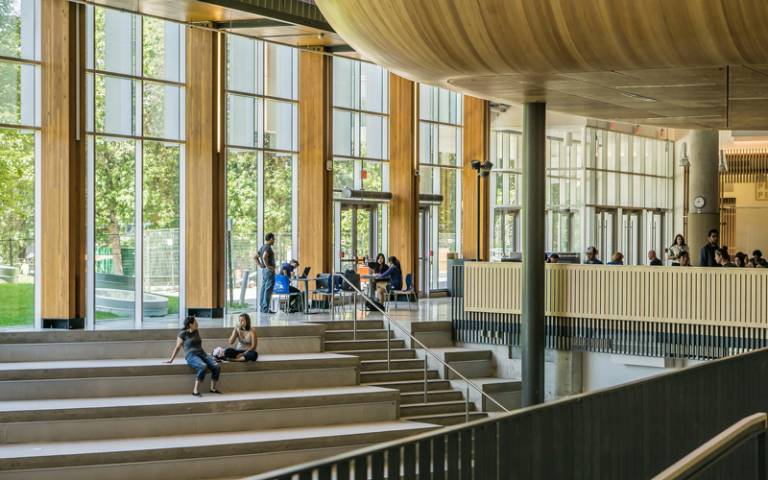IEDE announces Funded PhD Studentship in Smart and Healthy Higher Education Buildings and Campuses
12 April 2019
A Fully funded PhD Studentship in Smart and Healthy Higher Education Buildings and Campuses sponsored by FCBStudios has become available at UCL IEDE.

Supervisors
Professor Dejan Mumovic, (Energy, Indoor Air Quality), UCL IEDE, Professor Peter Raynham, (Energy, Light and Lighting), UCL IEDE, Professor Jian Kang, (Acoustics and Urban Soundscapes), UCL IEDE
Industry Sponsor
Feilden Clegg Bradley Studios is an architectural and urban design practice with an international reputation for design quality, for pioneering environmental expertise and a progressive architectural approach. We are proud to have won the RIBA Stirling Prize for Accordia, a scheme which is widely regarded as setting a new benchmark for housing in the UK.
FCBStudios believe that design is about a contemporary response to people and place and, at its best, should be progressive and transformative. The face of architecture is changing and we continue to pioneer radical and inclusive ways in which we create exceptional buildings. Our R&D activities are steadily becoming an integral part of our business to prepare for the future, underpinning our designs to ensure future resilience.
Context
Higher Education (HE) buildings are complex, dynamic, socio-technical systems seeking to provide solutions to a multitude of conflicting design and operational issues. At a basic level, the built environment is fundamental to the occupants’ sense of well-being.
HE buildings – encompassing a variety of learning spaces – pose a great challenge to designers and engineers, as they are more complex in their environmental needs than most structures. The challenge here is not just the fact that they usually have high heat loads due to their full or nearly full capacity most of the time, but also their transient nature as students come and go.
Modern education reflects an increasingly large and diverse student population, and requires teaching and learning spaces such as architectural studios requiring specific ventilation and lighting requirements. The variety of learning spaces also need to perform well acoustically, both for the spoken word and for music, and as sound amplification is generally not used, background noise control is critically important. Although complex, achieving the balance point between provision of indoor environmental quality and energy use is unfortunately just one of many socio-technical engineering challenges in HE buildings and campuses.
PhD project aims
(a) how to design, engineer and facilitate HE buildings and campuses for changing pedagogical practices to support a mass education system, and greater student diversity
(b) how the overall indoor environment quality and outdoor environment affects the students and staff satisfaction, comfort, health and wellbeing
(c) to evaluate the recent BS ISO 17772-1:2017 “Energy performance of buildings. Indoor Environmental Quality. Indoor environmental input parameters for the design and assessment of energy performance of buildings” which specifies requirements for temperature, indoor air quality, lighting and acoustics, in the context of HE buildings.
This study will employ experimental methods. It will utilise a mix of physical space measurements (Indoor Air Quality, temperature, acoustics, lighting, visibility/views), occupant reported feedback (diaries, questionnaires, interviews), and occupant behaviour (productivity, movement, physiological response) to identify the conscious and subconscious choices made by the occupants. The methodology will embrace Internet of Things (IoT) technology that can be incorporated into new buildings.
The findings of this PhD will provide evidence for the design of HE buildings and campuses that will reduce operational energy consumption, embracing smart technology and IoT to enable flexible and responsive spaces that can adapt to the requirements of the occupants.
Person specification
Applicants should have a Master level degree in one of the following subjects: engineering, architectural engineering, physics, architecture, and environmental psychology.
Studentship details and eligibility
The studentship will cover UK course fees and an enhanced tax-free stipend of approx. £18,000 per year for 4 years along with a substantial budget for research, travel, and centre activities. Applicants should meet the EPSRC eligibility criteria. The start date is September 2019.
How to apply
Please submit a pre-application by email to the UCL ERBE Centre Manager: bseer.erbecdt@ucl.ac.uk
The application should include the following:
• A covering letter clearly stating your motivation, and stating your understanding of eligibility according to these guidelines: https://www.epsrc.ac.uk/skills/students/help/eligibility/
• CV
• Names and addresses of two academic referees
• A copy of your degree certificate(s) and transcript(s) of degree(s)
Pre-application deadline: 25th May 12:00 noon (UK time)
Interview date: tbc
Following the interview, the successful candidate will be invited to make a formal application to the UCL Research Degree programme. For further details about the admission process, please contact: bseer.erbecdt@ucl.ac.uk
For any further details regarding the project, contact Professor Dejan Mumovic: d.mumovic@ucl.ac.uk
ERBE CDT
You will be undertaking this project in UCL Bloomsbury campus and FCBS London offices (10 minutes walking distance from UCL), as part of the new EPSRC-SFI Centre for Doctoral Training in Energy Resilience and the Built Environment (ERBE CDT). This is a collaboration between UCL, Loughborough University and Marine and Renewable Energy Ireland (MaREI). For more information, please see http://erbecdt.ac.uk
 Close
Close

